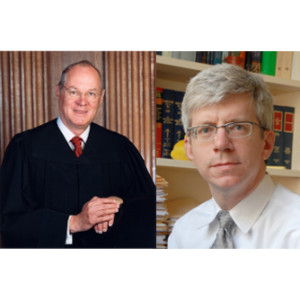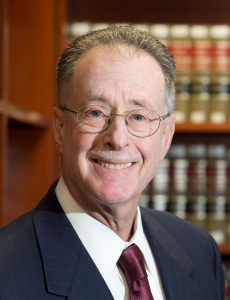Response by Professor Edward T. Swaine
Geo. Wash. L. Rev. Docket (Oct. Term 2014)
Zivotofsky v. Kerry, 575 U.S. ___ (2015).
Docket No. 13-628; argued November 3, 2014; June 8, 2015
Slip Opinion | NY Times | SCOTUSblog
Unusually, one of the majority’s goals was to promote this blockbuster solely in the U.S. market, avoiding global damage from the evident disagreement between the President and Congress over the status of Jerusalem. Whether it did so in a principled way, while refraining from putting its own thumb on the scales and judicially directing U.S. diplomacy, is something about which reasonable people will disagree. I want to focus on one means of evaluating that question—the novelty and integrity of the rule that the majority seemed to propose.
As everyone will have noted, the majority “decline[d] to acknowledge” the executive branch claim, premised on Curtiss-Wright, of an “exclusive authority to conduct diplomatic relations”;7 it did not conclusively repudiate this “sole organ” authority, but suggested it was unnecessary to resolve the case at hand, and unnecessary too to the holding of Curtiss-Wright.8 The same could be said of other aspects of the same Curtiss-Wright passage that the majority itself invoked,9 but no matter. Chief Justice Roberts, dissenting, agreed with the majority that the executive’s view seemed overbroad.10 The objection was a fair one, but the appeal of the executive’s approach becomes clearer once one considers the alternatives—assuming one puts aside Justice Thomas’s enviably clear tack of attributing presidential authority to the Vesting Clause and denying that Congress has legislative authority over passports to put up against it.
As part of its functional case for favoring the executive branch over Congress, the Court insisted on the need for the nation to speak with “one voice.”11 This had the virtue of invoking precedent like American Ins. Assn. v. Garamendi,12 and Crosby v. National Foreign Trade Council,13 but it had all the usual vices of that doctrine, and then some. Informed readers might have chuckled morbidly upon discovering that “the Executive has the characteristic of unity at all times”14 even before recalling the complications often posed by non-executive actors, like individual members of Congress and state governments, on issues like this. The majority might well distinguish such interference as falling short of recognizing, formally and on behalf of the United States, that Jerusalem was part of Israel, but by that measure this statute fell short too; hence the majority’s need to describe the “one,” unified voice as concerning the “topic” of recognition, and Justice Scalia’s understanding that the majority felt that “the Nation ‘must speak with one voice’ about the status of Jerusalem” rather than about recognition proper.15
Ultimately, the majority ducked its burden of articulating what any “one voice” had to be about, or what other voices necessarily had to shut up about, by positing something like an “own voice” doctrine: the proposition that, when the executive branch has exercised a constitutional function like recognition, no one can turn the President’s tongue against him. Hence, once the President has “formally recognize[d]” a state, “he consequently controls his statements on matters of recognition,”16 and “Congress cannot require him to contradict his own statement regarding a determination of formal recognition” in documents like passports.17 For the majority, “[i]f the power over recognition is to mean anything, it must mean that the President not only makes the initial, formal recognition determination but also that he may maintain that determination in his and his agent’s statements.”18 At least, it would seem, given that the executive branch had been steadfast in its Jerusalem position,19 though presumably even executives are sometimes permitted to change course.
This must have seemed like an artful way of avoiding nasty issues, like the outer limits of the executive branch’s exclusive diplomatic authority, but it does not feel like a functional place to draw the line, let alone one dictated by “common sense and necessity.”20 As the majority acknowledged, Congress could respect the President’s “own” voice by escalating outside of the recognition context, declaring war or imposing a trade embargo against even a presidentially-recognized nation.21 But nothing that dramatic is needed. Congress could adapt to the majority’s rule with a dissenting statute in its own voice: stating, clearly, that the statutory pronouncement in a passport or elsewhere does not derogate from the formal position of the United States regarding recognition, or that any statutory proclamation is just Congress’s two bits. Justice Kennedy explored a similar notion at oral argument, asking both sides about what he thought of as executive-penned “disclaimer,”22 but this fell from view by the time of the opinion.
Assuming one could distinguish such a statute from the one at issue in Zivotofsky–which, really, should have been understood as ventriloquism rather than anything in the President’s “own” voice, at least by anyone sophisticated enough to guess that someone listing “Israel” on a passport (as enabled by the statute) might possibly have earned it by being born in “Jerusalem” (which would not, then, be evident)— any of these variants might undermine the broader “one voice” objective just as seriously. Beyond that, the bigger problem is that the judiciary, and the line drawn by the Court, seem epiphenomenal. Conflicts between congressional statutes and the President’s recognition authority usually recede from the judiciary due to a lack of standing or other justiciability barriers, but the views they signal remain, even when the President does not heed them. Congress can also undermine the President’s preference by adopting hortatory measures; perhaps such congressional incursions could never control the many incidents of formal recognition, such as consequences for domestic litigation,23 but—again—neither did the statute immediately at issue. Even as such measures would compromise the “one voice” ambition, they would challenge the relative significance of maintaining an uncompromised, but marginalized, “own voice” of the President speaking through a small number of passports.
What, in the meantime, is a Court to do? In taking Zivotofsky, twice, on certiorari, the Court effectively put klieg lights on a rift between the U.S. Congress and the President regarding the status of Jerusalem. Congress genuinely succeeded at manufacturing a controversy and forcing the executive branch to articulate and defend its position on Jerusalem. It matters, of course, that the President prevailed before the Court, meaning that the pages both of the U.S. Reports and of passports will align for now with the executive’s policy. For the longer term, however, Congress may perceive a strategy for developing and differentiating its own voice on the existence and territorial scope of foreign states and for insisting that its views be heard and enforced by the judiciary against the executive branch. If the Court cares about the broader issue, it might have been better for it to decide—if it chose to enter into the controversy at all—whether Congress truly enjoys the capacity to “infringe on the recognition power” in a way that matters for these myriad variants, given what the majority acknowledged was Congress’s intent,24 rather than reason to a narrower, and not wholly persuasive, rule that Congress cannot “command the President to contradict an earlier recognition determination in the issuance of passports.”25 A functional premise may be better served by a more function-oriented, if fuzzier, rule. But these days, particularly for blockbusters, there seems to be an unrelenting appetite for sequels.
1. Curtiss-Wright Export Corp., 299 U.S. 304 (1936); Zivotofsky v. Kerry, No. 13-628, slip op. at 16–18 (June 8, 2015).
2. Youngstown Sheet & Tube Co. v. Sawyer, 343 U.S. 579 (1952) (Jackson, J., concurring).
3. Zivotofsky, slip op. at 6–7.
4. Id. at 13–20 (Thomas, J., concurring in the judgment in part and dissenting in part).
5. Id. at 15–19 (Scalia, J., dissenting).
6. Id. at 4 (Roberts, C.J., dissenting).
7. Id. at 16–17 (quoting Brief for Respondents, at 18).
8. Id. at 17–18.
9. Compare id. at 18 with id. at 10.
10. Id. at 5–6 (Roberts, C.J., dissenting).
11. Id. at 11, 26, 27.
12. American Ins. Assn. v. Garamendi, 539 U. S. 396 (2003).
13. Crosby v. National Foreign Trade Council, 530 U. S. 363 (2000).
14. Zivotofsky, slip op. at 11.
15. Id. at 14 (Scalia, J., dissenting).
16. Id. at 17 (emphasis added).
17. Id. at 18 (emphases added).
18. Id. at 26 (emphasis added).
19. Id. at 2, 26, 28.
20. Id. at 26–27.
21. Id. at 5 (Roberts, C.J., dissenting).
22. Tr. at 3-4, 28-29.
23. Zivotofsky, slip op. at 8.
24. Id. at 28.
25. Id. at 29.
Recommended Citation
Edward T. Swaine, Response, Zivotofsky v. Kerry, Geo. Wash. L. Rev. Docket (June 11, 2015), http://www.gwlr.org/zivotofsky-v-kerry/.



